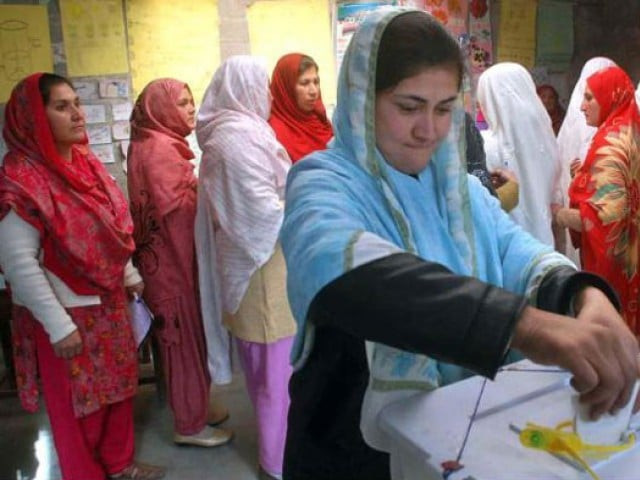Barring women voters: PHC denies groups asking for inclusion in PK-95 case
Says the court is present to defend the rights of women

Says the court is present to defend the rights of women. PHOTO: ONLINE
Different rights groups and activists appealed to the Peshawar High Court to become party in an ongoing case against women not being allowed to vote during the PK-95 Lower Dir by-elections.
However, the court dismissed their application on Tuesday, saying the groups had no direct involvement in the case and there was no need for their inclusion.
A division bench comprising Chief Justice Mazhar Alam Miankhel and Justice Irshad Qaiser announced its decision against the rights groups’ petition, saying the court was there to protect the rights of women as it does for all citizens. Therefore, rights groups and activists from areas other than Lower Dir should not interfere, he added.
The organisations and individuals asking to be made part of the case included the National Commission on the Status of Women (NCSW), Aurat Foundation, social activist Tahira Abdullah, and ANP worker Bushra Gohar.
NCSW speaks up
Mohsin Kiani, an attorney representing NCSW, informed the bench that Parliament set up the commission under the NCSW Act in 2012 to work for women’s rights in Pakistan.
Read: Women and voting: a long road ahead
He also informed the court that Pakistan is a signatory to the Convention on the Elimination of All Forms of Discrimination Against Women (CEDAW). It holds the country accountable to ensuring that women’s rights are protected.

“We have recorded our statement before the Election Commission of Pakistan after it took notice of the woes of women who were not allowed to vote in the by-polls in PK-95, Lower Dir,” Kiani said. He added up to 53,817 female voters were denied their right to vote. “This problem comes directly under the statutory obligations of NCSW,” he said.
“Our duty is to act as a watchdog and to suggest amendments to improve existing laws,” he added.
PHC’s dissent
Jamaat-e-Islami’s candidate Aizazul Mulk, who had won the by-elections in PK-95 earlier this year, challenged the NCSW and ECP’s decision to conduct re-polls in the region. His lawyer, Ghulam Mohiuddin, questioned the NCSW Act, saying it does not extend to the Federally Administered Tribal Areas (Fata) and Provincially Administered Tribal Areas (Pata).
The chief justice asked whether or not women’s rights could be protected in those regions in the absence of the NCSW. He remarked that no one from the constituency complained or appeared before the commission over this issue. Had it been a problem, women would have come forward, he believed.
Read: Women vote in Dir by-poll as PPP beat JI
Aizazul Mulk’s lawyer raised another point saying that the NCSW was neither a voter, nor belonged to the constituency, nor was it an eye-witness to the situation. He asked how it could record a statement in front of the ECP and ask for re-polls.
Mohiuddin said the applicants got their information from the local media. “They are unaware of the ground realities and that is the reason the application should be dismissed,” he added.
Shumail Ahmad Butt, representing the Election Commission of Pakistan in the court, defended the claims of the NCSW and others to become party to the case. He said there were two types of parties in legal cases; the necessary party and the proper party. He believed NCSW was an example of the latter.
He also said there are two laws that are related to the case; namely the Khyber-Pakhtunkhwa Establishment of Commission on the Status of Woman Act 2009 and the other National Commission on the Status of Women Act 2012. Under these laws, if the provincial assembly passes a bill that contradicts a law made by Parliament, that bill would be made void.
Butt said that the commission was clothed as an organ of the government to act like a statutory body to supervise laws under the Constitution. He said the commission is allowed to act as a proper party when ECP sought its assistance in the case.
Butt said all eyes were on the case and any judgment would have far-reaching outcomes that would set the precedent for such kind of cases in future. However, the bench interrupted him and assured the case would be decided purely on merit.
Published in The Express Tribune, October 14th, 2015.













COMMENTS
Comments are moderated and generally will be posted if they are on-topic and not abusive.
For more information, please see our Comments FAQ